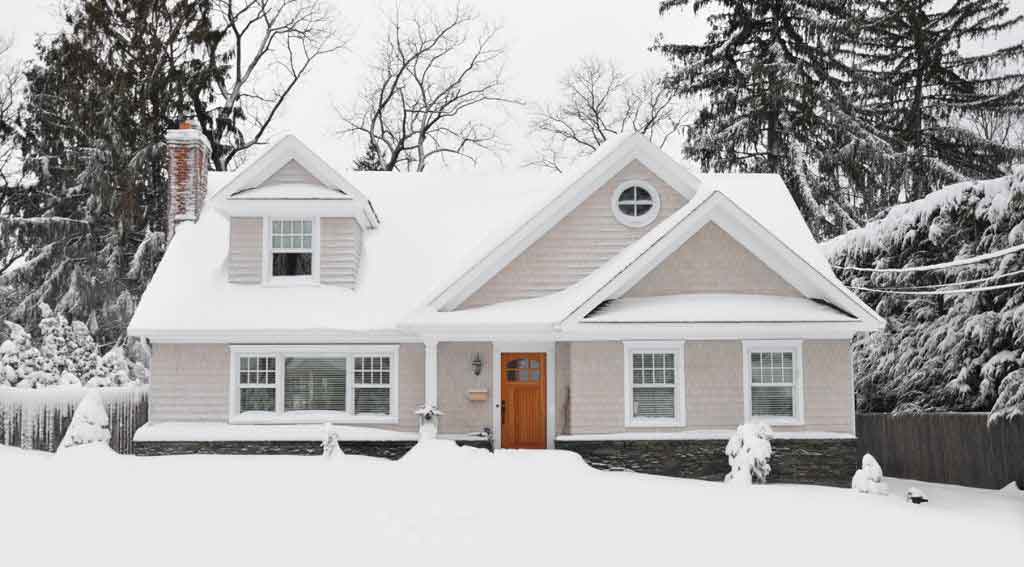
© 2017 MNKY Studio (example of featured image caption text)
If you are a snowbird heading south for the winter, there are several key things you can do to help protect your vacant home.
Taking these steps can help protect your home from theft, water damage, heating or electrical system malfunctions and other possible threats while you are away for an extended period of time.
1. Make Your Home Appear as Though It Is Continuously Occupied
- Forward your mail, stop newspaper delivery, and ask a friend or relative to collect flyers or other items that may be left at your door.
- Arrange for someone to remove snow after storms.
- Put motion-sensitive exterior lights and interior lights on timers and set them to come on at varying times to discourage prowlers.
2. Take Steps to Protect Your Home from Thieves
- Confirm that your alarm systems are in working order and have been activated.
- Secure external doors and windows with deadbolt locks, security-type hinges and sturdy door frames that cannot be spread apart. Install slide locks or other equivalent security locks on sliding glass doors or French doors.
- Store valuables that you are not taking with you in a safe deposit box or other secure offsite location.
- Do not post your vacation or travel plans on social media sites, as potential thieves can use that information to learn that your house is vacant.
3. Protect Your Pipes to Avoid Water Damage by Turning Off Your Water Supply
- If a pipe bursts or leaks while you are away, it could cause significant damage. Consider completely turning off the water supply if no one will be in the home for an extended period of time. If your home is heated by an older steam heating system, consult with your heating professional to determine if it is safe to turn off the water supply for your particular heating system. Also, if your home is protected by a fire sprinkler system, do not turn off the water to this system.
- Drain your pipes of all water by opening the faucets, and flush your toilet to clear the water from the tank and bowl, then consider pouring antifreeze in toilet tanks and bowls to prevent any remaining water from freezing and cracking.* Always use non-toxic antifreeze rated for plumbing systems.
- To help confirm that the pipes have been drained, consider having a plumber blow compressed air through the pipes.
4. Keep Your Home and Plumbing Warm if Your Water Supply Stays On
- If you decide against draining your water pipes, keep the furnace running to help ensure the home stays warm and the pipes do not freeze.
- Set the temperature at 55°F or higher to help keep the interior of the floor and wall cavities, where the water piping is likely located above freezing temperatures. Keeping room and cabinet doors open also helps heat to circulate and warm the areas where pipes are located.
- Shut off the water to washing machines and dishwashers where possible, to avoid any leaks or broken hoses while you are away.
- Turn off the heat source and water supply to hot water heaters (if separate from your boiler).
- Consider shutting off and draining outdoor water faucets to prevent vandalism and freezing damage.
- Have a water flow sensor and a low-temperature sensor installed on your main water supply pipe and hooked into a constantly monitored alarm system or your smartphone.
5. Perform Routine Maintenance Before You Leave
- Have your heating system inspected and serviced before winter. Have your fuel tanks filled before you leave, and ask someone to check on heat and fuel levels regularly while you are gone.
- Be sure to maintain electrical power if required to keep the heating system running. If electrical service to the home is to remain on, consider having a licensed electrical contractor inspect your main electrical panel, wiring, and outlets, if necessary. This way, they can repair or replace anything that may be defective.
- Have your roof inspected before you leave and clean your gutters to help prevent ice from building up.*
- Remove dead trees or large overhanging limbs that could damage your house.
- Unplug all unnecessary appliances before you leave. Make sure you can retrieve messages on your home answering machine or voicemail so it does not indicate FULL or unattended when someone calls.

